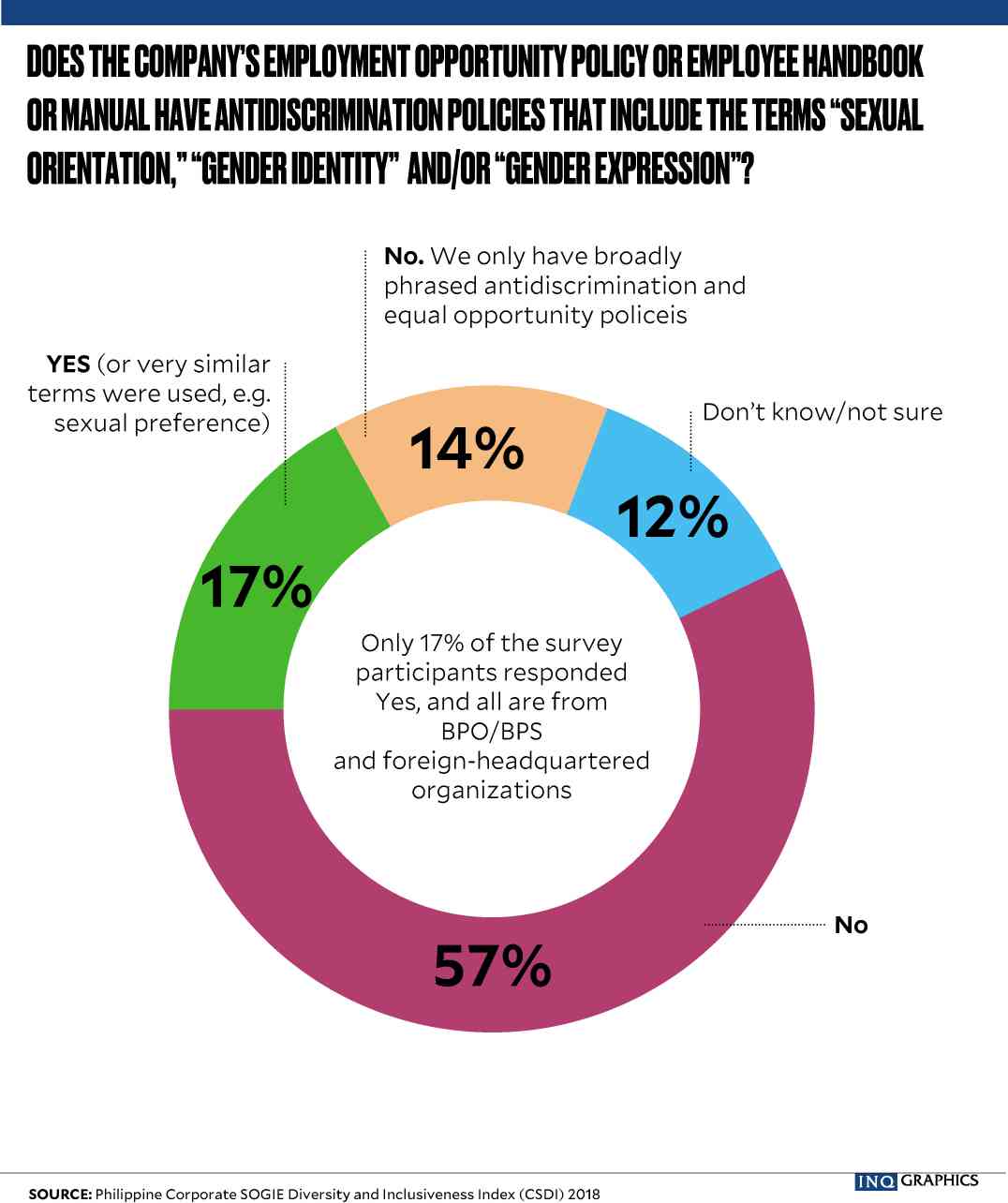When it comes to corporate policies on sexual orientation, gender identity and gender expression (Sogie), companies in the Philippines still have their work cut out for them, based on the results of a study by the Philippine LGBT Chamber of Commerce.
According to the recently published and first Philippine Corporate SOGIE Diversity and Inclusiveness Index (CSDI) 2018, none of the Philippine-based companies and public sector agencies surveyed had policies that explicitly reference “sexual orientation,” “gender identity” and/or “gender expression.” These organizations make up
56 percent of respondents, while the rest are either foreign-headquartered or fall under the business process outsourcing (BPO)/ business process services sector.
The Philippine LGBT Chamber of Commerce surveyed a total of 100 companies (267,000 employees), with these objectives in mind:
To establish a quantitative baseline SOGIE Corporate Diversity and Inclusiveness Index across the top corporations as well as other small and medium enterprises in the Philippines;
To obtain insights on steps companies are taking to ensure greater equity for LGBTQIAP+ (lesbian, gay, bisexual, transgender, queer, intersex, asexual, pansexual; the plus sign stands to incorporate other marginalized and minority sexuality/gender identities) workers and their families in terms of comprehensive policies, benefits and practices; and
To use the study findings to craft programs that will help companies and organizations advance inclusive policies in the workplace.
What they found as the best examples of gender-inclusive workplaces for the LGBTQIAP+ community are BPOs or foreign-headquartered companies, as 17 percent of them have antidiscrimination policies in place which are Sogie-specific.
The report does note, however, that less than half of such companies “have policies that reference specific behaviors and actions against LGBTQIAP+ employees that are discouraged or not permitted (use of slurs, catcalling, ‘outing,’ misgendering.)”
Other highlights of the study:
Apart from the companies that explicitly reference Sogie, 14 percent have broadly phrased antidiscrimination and equal opportunity policies, which can be interpreted to also cover
Sogie.
Of the 71 percent that do not have Sogie-inclusive policies or only have broadly phrased policies, 59 percent explicitly said they were not working on them, and the remaining 41 percent said they “don’t know” or were “not sure.”
Over 40 percent of the respondents shared that to their knowledge, no LGBTQIAP+ employees had reached out to management to discuss having Sogie-based antidiscrimination policies in the workplace,
while 59 percent were either not sure or were not aware if this happened in their company. Only 15 percent reported that external organizations have reached out to them to offer help in developing Sogie-inclusive policies.
Based on such findings, the Philippine LGBT Chamber of Commerce recommends that for companies to get started on crafting Sogie-specific policies, they should “engage with LGBT advocacy organizations to do an audit of their existing policies, and see what’s lacking, or what could be tweaked or what needs to be revised,” says Evan Tan, vice chair for business and industry.
Tan adds their organization is already helping local businesses become more LGBT-inclusive through the chamber’s #Zeroto100PH campaign, which aims to get 100 companies to pledge their commitment to work on LGBT initiatives for their respective businesses.
“For impact, we’re targeting the larger companies, of course, but we’re not averse to including medium-sized businesses. We’ll do an assessment of the Filipino companies we’ve reached out to for the CSDI and ask them,” Tan says.
